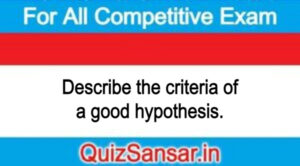
Describe the criteria of a good hypothesis.
Describe the criteria of a good hypothesis.
Ans.
The first foremost advantage of a hypothesis is that it builds researcher’s confidence in his results. The researcher who hypothesis a relation in advance gives the facts a chance to prove or disprove anything. Like a player in a game of chance, the researcher also first makes his bet and then waits for the result to confirm or disconfirm his bet. This is more powerful evidence than simply waiting without betting.
Second, a sound hypothesis gives direction to the inquiry; it aids in delimiting and singling out pertinent facts, and in determining which fact may be included and which omitted. The use of hypothesis thus prevents a blind search and indiscriminate gathering of heaps of data which may later prove irrelevant to the problem under study. Without hypothesis our research is illusory for we do not know what specific facts to look for and cannot recognize what is relevant to the inquiry.
Finally, a good hypothesis enriches theory. After a hypothesis has been verified and confirmed it becomes a part of theory. That is why it is said that a theory is an elaborate hypothesis. Even if a hypothesis is not confirmed it enriches theory-it advances knowledge since it cuts down the total universe of ignorance and sometimes shows alternative lines of investigation.
The only possible disadvantage of a hypothesis is that it may bias the investigator towards a particular position and cause him to lose objectively. The need not always be so if the investigator conceives a hypothesis merely as an assumption which he should consider and not as a position which he should defend.
Criteria of a Good Hypothesis
A good hypothesis must satisfy the following criteria:
1. It should provide tentative answer to the proposed problem. This can be in the form of a declaration of statement or in the form a directional or in a null form.
2. It should be operational, that is, there should be a method for recording and measuring the variables involved in the hypothesis.
3. It should be as simple as possible. If two hypotheses are advanced to explain a phenomenon that one is simpler which can explain the phenomenon across a wide variety of situations without qualification or which employs a smaller number of causes to explain the phenomenon. For example, if we come across a man who can correctly guess the colours (heart, club, diamond, spade) of playing cards, we may either say that he possesses extrasensory perception or that he managers to peep into the cards in some manner. Clearly, the latter would be a more simple hypothesis than the former. Why should we unnecessarily ascribe higher capacities to the man in question if the postulation of lower ones can equally well explain his behaviour?
4. It should be specific but not trivial or inconsequential. A very hypothesis, no doubt makes the problem unworkable. But a very narrow hypothesis cuts the life out of it. A thesis for example, on the simple relation between the ‘speed of reading’ and ‘size of type’ while important and may be even interesting, is too for doctoral study.
5. A hypothesis must always be stated in advance of collecting evidence aimed at its testing. If and only if a hypothesis is stated in advance of collecting facts aimed at its testing was such that it is useful in the verification or repetition of the hypothesis. The reason for this is that the hypothesis is stated in advance of observing data aimed at its testing there the possibility that such data will not provide support for the hypothesis if, on the other hand, the hypothesis being ‘tested’ is developed by first observing the data aimed at its ‘testing’, it will always be supported by such data. This will be ‘not playing the game fairly’. This will be like throwing the dice first then betting.






